Tsarevich Nikolai Alexandrovich - how justified were the hopes pinned on him?
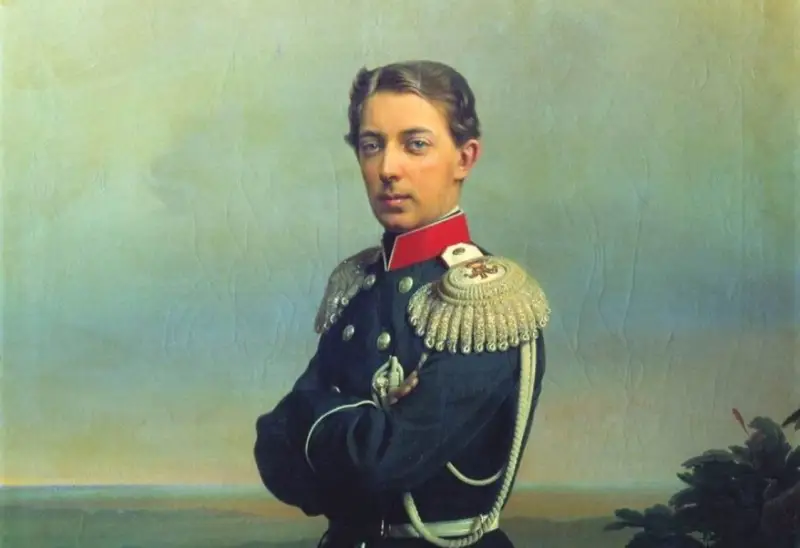
Portrait of Tsarevich Nicholas by Sergei Konstantinovich Zaryanko
Preamble, or what is common between Kurbsky and Alexander III
The other day I read about the prospects - in my opinion, vague - for the return of Russian property abroad, where, among other things, Nice appeared. Not surprising.
For in this city you can stroll along Nicholas II Avenue, while away the evening in a cozy cafe on Tsesarevich Boulevard and visit the largest Orthodox Western European church - in honor of St. Nicholas.
The name of the cathedral, designed in the Byzantine style, is connected not so much with the personality of the miracle worker who lived in Myra Lycia (now Turkish Demre), but with the eldest son of Alexander II - Tsarevich Nicholas, who completed his short earthly journey on April 12 (according to the Julian calendar) 1865 at Villa Bermon.
At the time of his death, brought to the grave by late diagnosed cerebrospinal meningitis, he was 21 years old.
According to reviews of people who were in close contact with the heir, he showed promise, and who knows how things would have turned out historical the path of Russia, if it were not Alexander, the second son of the nicknamed, who ascended the throne liberator sovereign, namely Nicholas.
Could the collapse of the empire have been prevented in this case? After all, like Nicholas I, Alexander III contributed to the economic development of the country, but at the same time considered the monarchical principle of rule unshakable.
Here it is appropriate to recall V. O. Klyuchevsky’s description of the internal policy of Nicholas I, which his grandson followed:
But reflected in the formula: praying, fighting and working, a similar principle is effective in the class feudal medieval society.
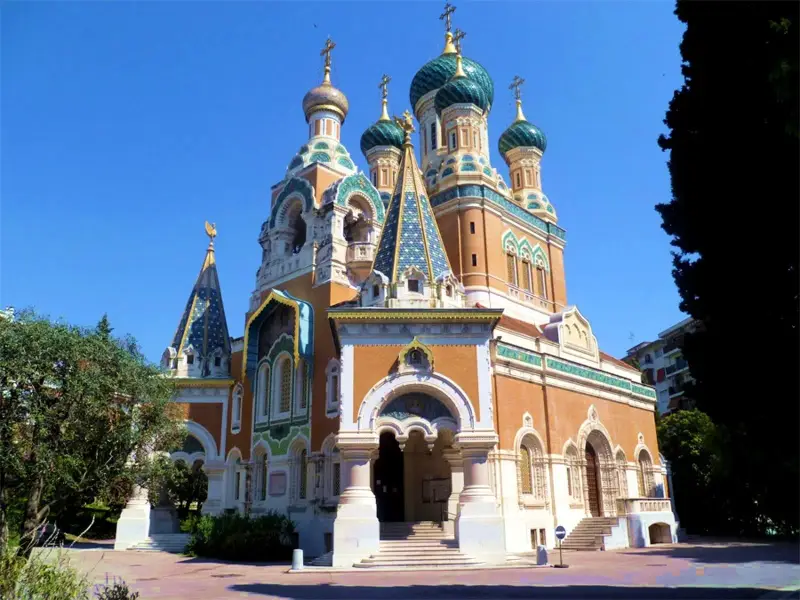
Cathedral of St. Nicholas in Nice
The realities of Russia, which entered the era of industrialization with one foot, looked different.
I suggest recalling Chekhov’s “The Cherry Orchard”: a bankrupt noble family, whose ancestors, perhaps, who served in the guard, by historical standards, had recently changed monarchs on the throne. And the grandson of yesterday’s serf who buys their estate.
This dichotomy can be seen especially clearly at the level of Gaev and Lopakhin: the feudal-landowner past of the empire and its bourgeois future; silence among the centuries-old linden trees of the dying patriarchal life of provincial estates, replaced by the roar, which so irritated K. N. Leontyev, of trains and the gloomy chimneys of factories making the surrounding landscape dull - the settlement described by M. Gorky in “Mother”.
The growth of the economic power of the Lopakhins made constitutional reform inevitable.
But the Gaevs didn’t understand this. Although the estates of many of them at the time of the abolition of serfdom were mortgaged or remortgaged.
The correspondence between Kurbsky and Grozny came to mind in this regard. Yes, the era is different, but in the lines of messages from former friends, as on the varnished parquet floor of Ranevskaya’s estate being sold for debts, two Russias met.
Kurbsky thought in terms of the Middle Ages, the princes of the pre-Mongol era with their vision of the principles of their own freedoms and power, independent of Kyiv.
Ivan the Terrible stepped from the Middle Ages into the New Age and looked at autocracy with the same gaze as Peter I.
But Kurbsky, despite all his education, did not understand the new socio-political realities that were transforming the psychology of the elites, within which the ruler was no longer thought of as simply the first among equals.
And Gaev? He tries not to notice Lopakhin, for him he is not a successful businessman who, a little time will pass, and on the threshold of a bankrupt nobleman (if anyone has read “The Summer of the Lord” by I. S. Shmelev, remembers this type of bankrupt landowners in the image of Entaltsev) his home is not let him in, but the slave.
And in an earlier work, Turgenev’s “Fathers and Sons,” the loss, in fact, of a privileged position was shown by the nobility. Pavel Kirsanov is the past. Bazarov, albeit sloppy, is the future.
And it became impossible not to notice the Bazarovs, and later the Lopakhins, and Gorky’s Vlasovs, with the dissolute suburban factory youth, especially considering the desire of the bourgeoisie and intelligentsia to participate in political life, which was expressed in the formation of A.I. Guchkov and P.N. Miliukov, respectively, of the Octobrist and Kadet parties.
In the end, this became, albeit a clumsy, step towards the formation of a non-class civil society, towards the transformation of a military-feudal monarchy into a bourgeois one.
But neither Alexander III nor Nikolai II wanted to notice the Bazarovs and Lopakhins, or, more precisely, they did not want to take into account their growing political ambitions.
The first, as well as his teacher K.P. Pobedonostsev - a very extraordinary man, by the way - is appropriate to compare with Kurbsky, since from the point of view of the principles of government they were oriented towards the past rather than towards the future.
Hence their desire freeze Russia, which the Chief Prosecutor of the Synod saw as an icy desert through which a dashing man wandered. I add on my own behalf – in the person of, let’s say, Rakhmetov.
Accordingly, perhaps, after a somewhat drawn-out introduction, the question is: could the timely reforms not only prevented - they hardly could have prevented - but at least smoothed out the consequences of the activities of people like the mentioned character in the novel by N. G. Chernyshevsky?
Would Nikolai have decided to publish the manifesto that came from the pen of his nephew in October 1905? Would he have found intelligent, like-minded people who shared his views?
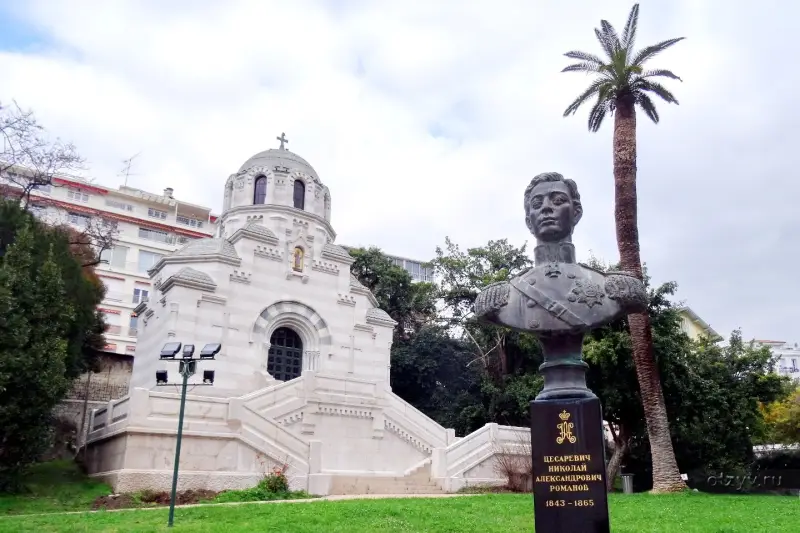
Nice
Would he have saved Russia from the first revolution and being drawn into the First World War (in my opinion, he would not have dragged Russia into the Russian-Japanese war, but the political and even more economic background of the conflict with the Empire of the Rising Sun, all this mess with ugliness, deserve a separate discussion) .
Of course, when discussing the possible steps of the eldest son of Alexander II, should he ascend the throne, we are entering the realm of speculation, but we will still try to create, albeit incomplete, a moral and intellectual portrait of this man, based on the memories of his mentors.
Yes, an important remark: talking about autocracy after the death of Peter I is unscientific. The country was one large noble fiefdom. And all the “autocrats”, with the exception of the unfortunate Paul I, understood this very well.
Even Alexander III, unreasonably named peacemaker - the absence of wars during the thirteen-year reign of the penultimate king is by no means his merit - he correctly realized the state of affairs.
Matched the best students
So, Russian literature was taught to the heir by the outstanding linguist and folklorist, Professor of Moscow University F. I. Buslaev, who replaced the writer I. A. Goncharov in this field.
Impressed by his lectures, Nikolai read them to his associates and even planned to teach Russian language and literature to his fiancée, the Danish princess Maria Dagmar.
It was thanks to the professor who left interesting memoirs that the young man fell in love with and became an expert in the creativity of the people he was preparing to rule.
And one day, during a trip, he struck an old man - a storyteller of epics - when he began to sing along with him.
And Fyodor Ivanovich himself spoke highly of the heir’s talents:
In addition to the lectures themselves, the heir invited his teacher to evening tea parties:
Lectures on Russian history of the 18th–19th centuries. K. D. Kavelin and S. M. Solovyov read to the young man. The latter spoke of the Tsarevich like this:
B. N. Chicherin, who taught him law, assessed the heir in a similar way:
And here is what N.H. Bunge, who headed the Ministry of Finance under Alexander III, wrote about Nicholas:
Here is an important detail: I have never encountered such assessments of the abilities of the future tsars, Alexander III and Nicholas II, as well as the father and grandfather of the hero of this article.
On the contrary, here is the description given to Tsarevich Alexander by K. P. Pobedonostsev:
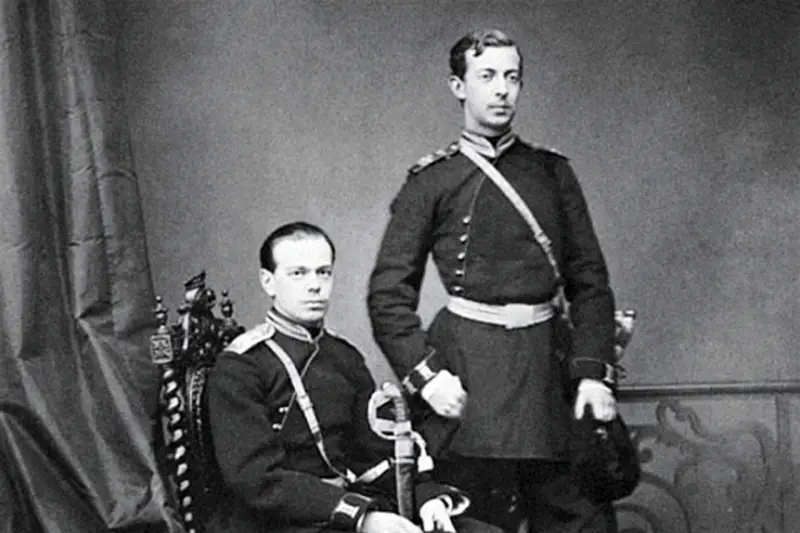
Nikolai and Alexander - future III
Or here are the lines about Alexander III, given in the work of historian E. P. Tolmachev:
And in confirmation of what was said: Alexander himself once wrote, next to one of Pobedonostsev’s phrases that he did not understand, “Stupidity».
I will also give an excerpt from the work of historian K. A. Solovyov:
As for the last tsar, let us turn to the memoirs of S. Yu. Witte:
Of course, the assessments given, especially by Witte, are subjective. After all, professors were accustomed to lecturing to engaged and engaged audiences and may have approached their heirs with high expectations and too high demands.
The latter is quite likely. But their praise towards Nikolai is all the more valuable.
Accordingly, don’t the above quotes contain proof of the validity of the truly enlightened monarch Russia was expecting, a philosopher on the throne, about whom Plato dreamed and who could turn out to be the eldest son of Alexander II?
Let’s not rush to conclusions, but turn to the words of the historian F.I. Melentyev (most of the quotes in this article are taken from the works of this particular researcher):
To the above lines we add a quotation from the work of E. P. Tolmachev:
A soft heart in the cynical world of politics is inappropriate, and even dangerous - both for the country and for the personality of the ruler himself, his family and entourage. And if this soft heart is also hidden from harsh realities behind the palace windows, then the situation in the state can only get worse.
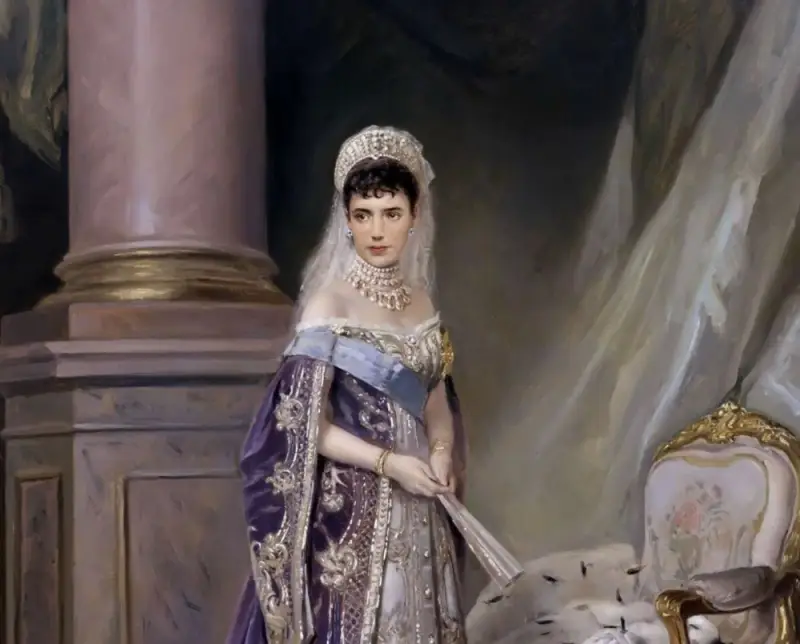
Empress Maria Feodorovna, portrait by Vladimir Makovsky. The Danish princess Maria Dagmar was the bride of Nicholas, but after his death she married Alexander, converting to Orthodoxy. Fedorovna is the traditional middle name for Russian empresses. Upon the accession of her son Nicholas II to the throne, she bore the official title "Dowager Empress"
At the same time, F.I. Melentyev notes:
The Tsarevich himself, apparently, understood the limitations of his knowledge and expressed a sincere desire to become more familiar with the way of life of his subjects, for which he went on a trip around Russia, some episodes of which are described in some detail by Richter and Buslaev.
He left the most favorable impression.
However, knowledge of folk art and ideas about the life of various segments of the population, good character and openness are one thing; but understanding the complex specifics of, say, community life is another. Not to mention the painful and essentially unresolved land issue, and the problems associated with economic growth.
In addition, the picture of folk life presented to the heir through the efforts of local authorities could not help but be varnished and even partly popular.
Don't forget about the axiom: the emperor is made by his retinue. That is, the future of the country depended not so much on the personality of the monarch, but on his ability to select personnel.
Against the softness of Konstantin and for the rigidity of Muravyov
However, we can formulate certain ideas about the possible nature of Nicholas’s domestic policy – and even partly foreign policy.
The mentioned trip took place in 1863, when the western part of the empire was engulfed by the Polish uprising, supported at the diplomatic level by England, Austria and France, and on the part of the latter two it looked extremely short-sighted, in the face of growing contradictions with the growing power of Prussia.
A little time will pass, and Franz Joseph will receive Königgrätz, and Napoleon III will receive Metz and Sedan. In St. Petersburg, they won’t lift a finger to intervene. On the contrary, in 1871 they refused to implement the articles of the Paris Peace Treaty.
How did the crown prince assess the events taking place on the banks of the Vistula?
Russification, you will agree, is a rather harsh step. Nicholas did not support the conciliatory policy in the Kingdom of Poland, pursued by the governor - his uncle, Grand Duke Konstantin Nikolaevich, but sympathized with the harsh measures of the Vilna Governor-General M. N. Muravyov, nicknamed “hangman».
At the same time, Mikhail Nikolaevich is an ambiguous figure: a hero of the Patriotic War, who, in addition to the policy of intimidation, carried out reforms in the region entrusted to him.
In order to pacify the Poles, Nikolai Alexandrovich was ready to escalate with the named powers that nominally supported them. True, after the Prussians defeated the French, the latter clung to Russia with both hands.
But something else is important: as the Tsarevich’s assessment of the Polish events showed, for the sake of his understanding of the good of the empire, he was able to show firmness and initiate tough, although hardly justified, measures.
And who knows: suddenly, having ascended the throne, Nikolai, like his brother and nephew, saw in the ambitions of the Lopakhins a threat to Russia and froze her, taking advantage of the aforementioned advice from Pobedonostsev, and unwittingly clearing the way for the radicals?
Or would the abilities noted by all the teachers allow him to steer the ship of the empire along an evolutionary path, avoiding revolutionary upheavals?
Instead of an epilogue
Let's imagine that Alexander I passed away in the year 1806. AND? Who would doubt that he would carry out constitutional reforms and even prophesied the abolition of serfdom.
No, how could it be otherwise: a student of the republican La Harpe, who formed a Secret Committee from liberals, one of whose members was Count P. A. Stroganov, took part in the Great French Revolution, the storming of the Bastille and was enrolled in the Jacobin Club. That is, not even a liberal - a revolutionary, but one who entered the trusted circle of friends (another question: can a ruler have friends?) of the young emperor.
And M. M. Speransky, an Anglophile close to the court, is not an aristocrat at all? Supporter of the principle of separation of powers.
The reality, as we know, turned out to be somewhat different. The same could have happened to Nicholas, had he ascended the throne.
On the other hand, and answering the question posed above: timely constitutional reforms and Russia’s non-interference in the brewing conflict of world powers, even by terminating the alliance with France (which, of course, would have damaged the reputation of St. Petersburg in the international arena, although there were similar precedents; let’s say , represented by Italy in 1915), could allow it to continue to follow the evolutionary path of development, transforming over time into a constitutional monarchy.
Использованная литература:
Melentyev F.I. The eldest sons of Alexander II and M.N. Muravyov
Melentyev F.I. Russian universities during the era of great reforms as perceived by Tsarevich Nikolai Alexandrovich
Poddelkova P.E. Military education of children in the families of grand dukes in the post-reform period
The Romanovs are on the road. Travels and trips of members of the royal family in Russia and abroad: Sat. articles / Rep. ed. M.V. Leskinen, O.V. Khavanova. - M.; St. Petersburg : Nestor-History, 2016.
Soloviev K.A. All-Russian Emperor Alexander III. M.: Komsomolskaya Pravda. 2015.
Tolmachev E. Alexander III and his time. M.: Terra, 2007.
Information